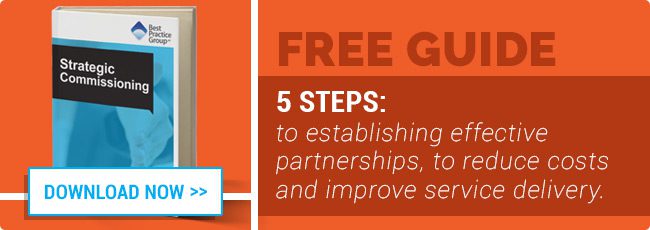Your strategic supplier in whatever project you have decided to look for assistance on, is a linchpin to its success, to the value optimisation that is achieved throughout the process, and to the outcomes that are actually achieved. Choose your strategic supplier wisely and you minimise friction and maximise productivity – make a mistake and things could quickly unravel.
Because of the importance of this decision we have put together a list of the five qualities you should be looking for, asking about, and assessing your potential partner against, when choosing a strategic supplier.
To be a supplier that you can have confidence in, that you can rely upon, they really must:
1. Know your strategic supplier’s strengths and limitations
No good can come from a complex supplier relationship that is founded on empty promises. It’s important to understand the pressure on your supplier to simply say ‘yes’ to all that is requested of them when a major project is set before them, leaving the question of ‘how’ to later on. Of course your supplier should offer a clear and honest assessment of their ability to achieve the goals of the project, but as we all know that does not necessarily happen every time. Therefore, it is important to make sure that your supplier has taken adequate time and effort to sanity check the solutions they will employ for your project, allowing them the opportunity to recognise where gaps in capacity may exist or occur.
It is better to start your relationship off with a clear understanding of your supplier’s strengths and limitations than to fall victim to the inevitability of inflated costs or poor delivery that will result from a deficiency in forethought. The more specific your supplier is about how their solution will achieve the outcomes expected from a project, the better it will be for everyone.
2. Have a thorough bid review process
Following on from the need for an honest review of what they can and cannot do for you as mentioned above, it’s equally important that your prospective supplier strictly adheres to a thorough, structured, bid review process.
Nothing banishes the desire for innovation and outcome optimisation – and increases the likelihood of strained relationships – like the miscalculation of a profit margin, thanks to a mad rush to submit the lowest possible bid to win a contract. Suppliers you can rely on have a structured bid review process which ensures each relevant level within their organisation must sign off on the skills, resources and funds needed to deliver the service that’s expected of them or to achieve the outcomes the client requires.
This is to prevent sales teams from rushing into over-promising which ultimately may mean they under-deliver on the project.
3. Be able to prove that they can learn from their mistakes
Perfection is a myth; each project has its challenges. And, therefore, what’s important to consider when choosing a supplier, is how your potential partner approaches these challenges, how they recover from them, and how they make sure that the opportunity for them to reoccur is minimised. It is worth assessing how suppliers have faced up to adversity in the past by asking all the right questions, because how they have grown from the experience could be a good indication of how they will approach issues when they occur in your project.
4. Be mindful of the need for control, collaboration and adaptation on a project
We have spoken at length in this and other articles about the fundamental need for clarity at the outset of any project:
- Clarity of purpose: Established through a thorough review by client of their outcome expectations, and by the vendor in their assessment of what they need to invest in time, resources and money on a project and their ability to meet client expectations; and
- Clarity of communication: To ensure that all parties are crystal clear on what is expected of them to avoid any ambiguity and misunderstandings that could plant the seeds of discord.
Your supplier must be committed to this, and detailed, thoroughly considered and agreed contracts help to create such clarity. It is important that these contracts are not only produced and assessed at the outset, but also followed and benchmarked against throughout the project with individuals on both sides responsible for making sure that this happens.
Clear understanding and common goals help to create a collaborative working environment where innovation can flourish, and recognition that these contracts should not be fixed and forgotten documents but flexible to the needs of the project is important. In fact, your contracts should be reviewed at least once every six months in order to ensure that they are being followed and are still optimised to the best value outcomes the project has the potential of producing.
5. Freely and diligently exercise their Duty to Warn
Supplier advice can steer a client’s opinions, dictate the direction of a project, and ultimately determine its success or failure. The significant responsibility this engenders must be recognised by the supplier you choose to work with. Their ‘Duty to Warn’ is a legal responsibility to let their client know not only their limitations on a project or gaps in the solution they are recommending to supply, but where issues lie within the client’s own proposals and expectations. Your chosen supplier should, however, consider this to be not simply a legal responsibility, but a moral duty to offer the best advice at all times, even if that risks their place on the project.
Choosing a Strategic Supplier
Your choice of supplier and the working relationship you develop with them will have a significant impact on the quality of the outcome on your project. There are a plethora of factors that will determine the direction it will take, but most important of all is the need for you to ask yourself how much you really know about your supplier, and to go about finding out a little more, in order to determine how they are likely to approach your project. Choosing a supplier based on the above listed criteria, or your assessment of their quality against it, will always be a good starting point.
Photo Credit: Shutterstock



